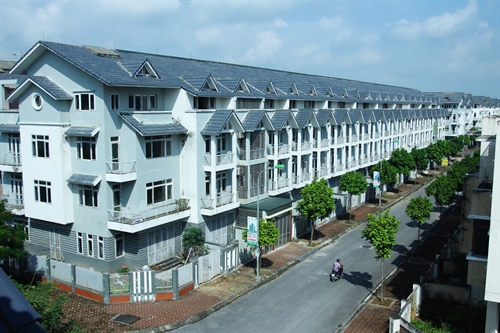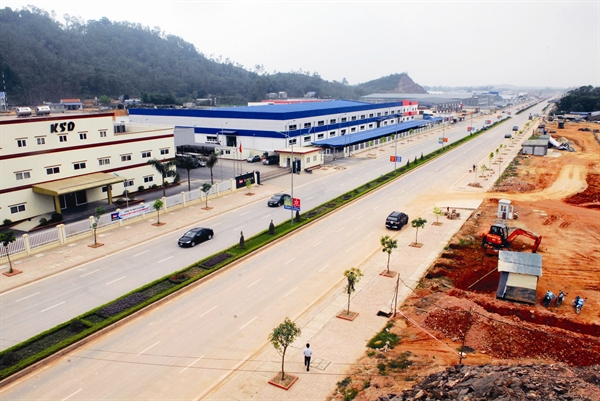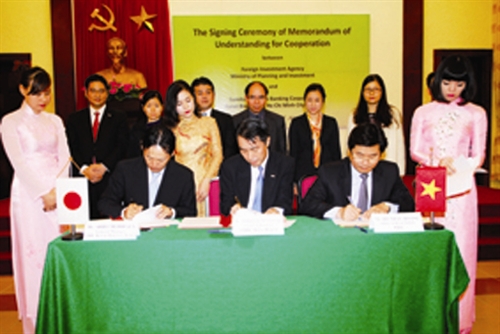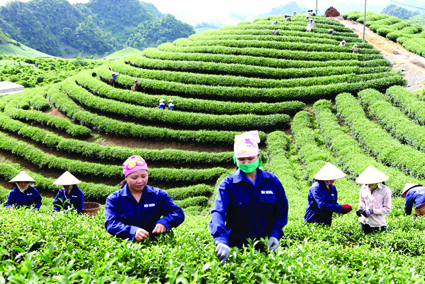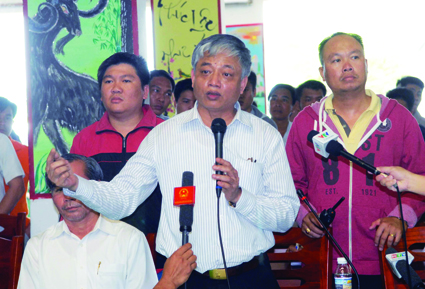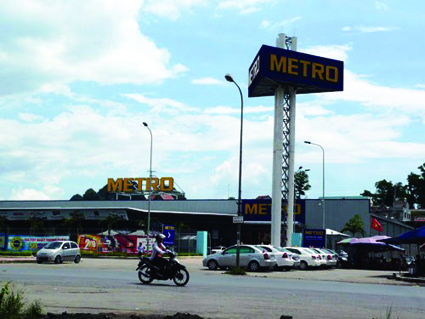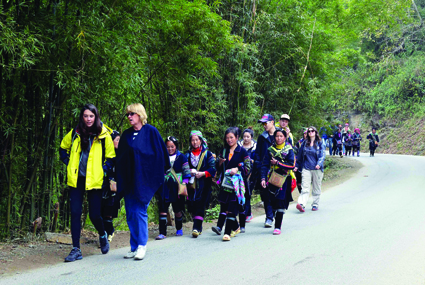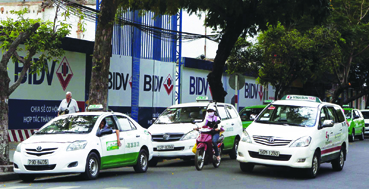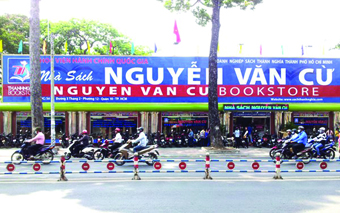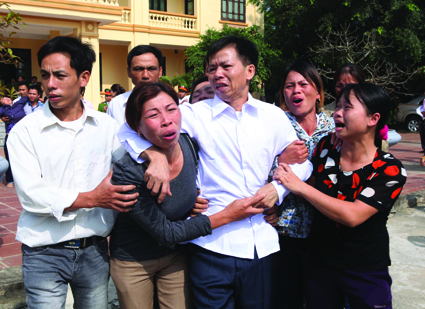The draft Political Report to be presented at the upcoming XIIth National Party Congress is now published in the mass media for public comment from September 15 through October 31. Below is an extract of the draft on national development goals and tasks during 2016-2020.
NATIONAL DEVELOPMENT GOALS AND TASKS DURING 2016-2020
1. Forecast of the world and domestic situations in the upcoming years
The world will still see very complex developments in the upcoming years but peace, national independence, democracy, cooperation and development remain the major trend. The process of globalization and international integration will further forge ahead. Cooperation, competition, fight and mutual dependence among nations, particularly major powers, will increase. The science and technology revolution, especially information technology, will continue to develop vigorously, boosting leapfrog development in many fields and bringing about opportunities and challenges for every nation.
The world political and security situations will change swiftly with complicated and unpredictable developments. Violations of national sovereignty, territorial and natural resources disputes, ethnic and religious conflicts, subversive intervention, terrorism, cyber war and localized war will remain severe in many parts around the world.
The world will evolve faster toward a multipolar and multicenter order. Big countries are adjusting their strategies toward cooperation and compromise as well as competition, fight and mutual restraint, which will greatly affect the world and regional order. Manifestations of extreme nationalism, hegemonism and pragmatism will increasingly emerge in international relations. Multilateral institutions will encounter major challenges. Developing countries, especially medium and small ones, are facing opportunities, problems and big challenges on their road to development. In this context, rally of forces, alignment, competition and fight among countries in the world and regions in the interest of every nation will continue to be complicated.
Global issues such as finance security, energy security, water source security, food security, climate change, disasters and epidemics will see complicated developments. The international community will have to more drastically cope with traditional and non-traditional security challenges, particularly cyber security and new forms of warfare.
The world economy is predicted to recover slowly and face numerous problems and challenges with unpredictable developments. Countries will increasingly involve in the global production network and value chain. World price fluctuations, financial and monetary instability and public debts will continue to exert unfavorable effects on the world economy. Economic interrelations among countries and regions are undergoing many changes. Most countries in the world will adjust strategies, restructure their economies, renew economic institutions and apply science and technology for development. Economic and commercial competition, fight for natural resources, markets, technologies and quality human resources among countries will become fiercer. There will appear new forms of economic alignment, international and regional financial institutions and new-generation bilateral and multilateral economic agreements.
Asia-Pacific, including South East Asia, will remain a dynamic development hub, holding an increasingly important strategic economic-political position in the world. It is concurrently a region of strategic competition among big powers, with many elements of instability. Disputes over territories and sea and island sovereignty in the region and the East Sea will remain fierce and complex. ASEAN will become a community which will further bring into full play its crucial role in maintaining peace and stability and boosting economic cooperation and alignment in the region, but at the same time will face many problems and challenges, external and internal.
Domestically, the position and power and overall strength of the country will increase and its international prestige will be increasingly promoted, creating important premises for national construction and defense.
The next five years will be the period for Vietnam to fully realize its commitments with the ASEAN Community and WTO, accede to new-generation free trade agreements and integrate into the world much more intensively and extensively than previously, thus requiring the Party, State and people to make great efforts to seize opportunities and overcome major challenges in the integration process.
The economy will incrementally get out from the state of decline and regain the growth momentum but still face numerous problems and challenges. Macroeconomy will remain unstable, public debts will increase fast, bad debts are decreasing but remain high, while productivity, quality, efficiency and competitiveness of the economy remain low.
The four threats which were pointed out by the Party still exist, particularly the economy lagging far behind countries in the region and world and peaceful evolution of hostile forces against our country. Degraded political thinking, ethics and lifestyle, signs of self-evolution and self-transformation in a part of officials, party members, civil servants and public employees, and bureaucracy, corruption and waste will still see complicated developments. The rich-poor gap and social stratification will increasingly grow, some aspects of social ethics degrade alarmingly, eroding the trust of cadres, party members and people in the Party and State. The protection of the sea and island sovereignty will face numerous major problems and challenges. The socio-political situation in some areas will potentially face risks of instability.
The world and domestic situations will create opportunities, advantages, disadvantages and challenges all at the same time, posing new more serious problems and more complicated requirements to the national renewal and development and protection of national independence, sovereignty, unity and territorial integrity, and requiring the Party, State and people to make greater endeavors.
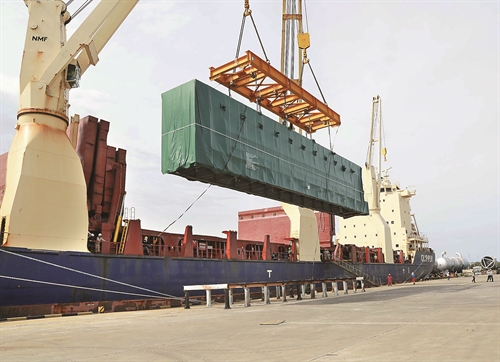 |
| Thermoelectric equipment modules manufactured by Doosan Vina (Quang Ngai province) for export to the US __Photo: Sy Thang/VNA |
2. National development goals and tasks in the next five years
To draw on the achievements and lessons of 30 years of renewal, particularly of the last ten years, to further implement effectively the judicious orientations and tasks set out in the resolutions of the Party, and concurrently renew strongly, comprehensively and synchronously with appropriate steps all fields, particularly economy and politics. To further renew the way of thinking, improve mechanisms and policies, promptly solve difficulties and problems in order to tap all potential and resources for the country and create a new momentum for development. To properly understand and handle factors creating momentum; to harmonize interests; to promote patriotism and the national spirit; to bring into play democracy and the strength of the national great unity; to promote the human factor and the role of science and technology to create a combined momentum for renewal and integration
Goals:
To increasingly build the Party clean and strong, to build the Party’s capacity of leadership, governance and fighting, to build the political system strong. To bring into play the national strength and socialist democracy. To comprehensively and synchronously accelerate renewal; to develop the economy fast and sustainably, to build the foundation for early turning the country into basically a modernity-oriented industrial one. To improve the material and spiritual lives of the people. To firmly protect the independence, sovereignty, unity and national integrity of the Fatherland, to protect the Party, State, people and the socialist regime. To preserve peace and stability for national development. To heighten the position and prestige of Vietnam in the region and world.
Overall tasks:
(1) To achieve higher economic growth than the previous five years on the basis of maintaining macro-economic stability, renewing the growth model and restructuring the economy; to accelerate industrialization and modernization, attaching importance to industrialization and modernization of agriculture and rural areas associated with building a new countryside; to develop a knowledge-based economy, to raise science and technology levels of all sectors and fields; to raise productivity, quality, efficiency and competitiveness of the economy; to build an independent, self-reliant and quickly and sustainably developed economy which effectively participates in the global production network and value chain.
(2) To further complete institutions to develop the socialist-orientated market economy; to raise the effect, effectiveness, discipline, publicity and transparency in economic management, the State’s administration capacity and corporate governance capacity.
(3) To basically and comprehensively renew education and training, to raise the quality of human resources; to accelerate science and technology development and application; to promote the role of education and training and science and technology as the national key policy for national renewal and development.
(4) To build Vietnamese culture and people meeting requirements for sustainable national development and firm protection of the socialist Fatherland.
(5) To develop health, to raise the quality of public healthcare; to ensure social security, to well implement policies on labor, employment, incomes and policies for persons with merits; to build a healthy, secure and safe living environment, raise the qualify of people’s life, and properly manage social development.
(6) To increasingly manage natural resources and protect the environment; to proactively prevent and control disasters and respond to climate change.
(7) To consolidate and enhance national defense and security. To build firm all-people national defense and people security; to build revolutionary, regular, elite and incrementally modern armed forces, prioritize modernization of a number of armed services, service branches and important forces; to firmly maintain political security and social order and safety; to firmly protect the independence, sovereignty, unity and territorial integrity of the Fatherland, to protect the Party, State, people and socialist regime.
(8) To pursue the external policy of independence, self-reliance, multilateralization, diversification and active international integration; to maintain a peaceful and stable environment, creating favorable conditions for the national construction and defense; to heighten the position and prestige of Vietnam in the region and world.
(9) To improve and promote socialist democracy and people’s mastery; to unceasingly reinforce and promote the strength of the national great unity; to increase social consensus; to further renovate contents and methods of operation of the Fatherland Front and mass organizations.
(10) To further complete the law-governed socialist state, to build the state apparatus streamlined, clean and strong; to complete the legal system, step up administrative reform and judicial reform, build a contingent of cadres and civil servants with qualifications and capacity meeting task requirements, promote democracy, increase responsibility and discipline; to enhance prevention and control of corruption, waste, bureaucracy, social evils and crimes.
(11) To build the Party clean and strong, to build the Party’s capacity of leadership and governance, enhance the working class’s nature and vanguard and fighting capacity of the Party, prevent and stop the degradation in political thinking, ethics and lifestyle, signs of self-evolution and self-transformation internally. To drastically renew personnel work, to attach importance to the protection of the Party and internal politics; to increase and improve the quality of ideological and theoretical work, inspection and supervision work and mass mobilization work of the Party; to further renew the methods of leadership of the Party.
(12) To further grasp and properly handle major relations: relations between renewal, stability and development; between economic renewal and political renewal; between observance of market laws and assurance of socialist orientations; between development of production forces and building and gradual improvement of socialist production relations; between the State and the market; between economic growth and cultural development and realization of social progress and equality; between socialist building and protection of the socialist Fatherland; between independence, self-reliance and international integration; and between the Party’s leadership, the State’s management and the people’s mastery.
Key targets:
a/ Economically
The annual economic growth in five years will reach 6.5-7% on average. By 2020, the average GDP per capita will reach USD 3,200-3,500; industry and services will account for over 85% of GDP; the total investment capital of the entire society in the five years will equal 32-34% of GDP on average; state budget deficit will not exceed 4% of GDP. Total factor productivity will account for around 25-30% of growth; the annual social working productivity will grow 4-5% on average; energy consumption per unit of GDP will decrease by 1-1.5% per year. The rate of urbanization will reach 38-40% by 2020.
b/ Socially
By 2020, agricultural labor will make up around 35-40% of the total social workforce; the rate of trained labor will reach 65-70%, with 25-26% possessing diplomas and certificates; the urban unemployment rate will be under 4%; there will be 10 medical doctors and over 26 patient beds per 10,000 people; the rate of health insurance coverage will reach over 80% of the population; the poverty rate will decrease by 1.3-1.5% annually on average.
c/ Environmentally
By 2020, 95% of urban residents and 90% of rural residents will have access to clean, hygienic water; 80-85% of hazardous wastes and 95-100% of medical wastes will be treated; the rate of forest coverage will reach 44-45%.- (VLLF)
